Medical expert of the article
New publications
Preparations
Effective syrups with bronchitis: from cough, expectorant, on herbs
Last reviewed: 23.04.2024

All iLive content is medically reviewed or fact checked to ensure as much factual accuracy as possible.
We have strict sourcing guidelines and only link to reputable media sites, academic research institutions and, whenever possible, medically peer reviewed studies. Note that the numbers in parentheses ([1], [2], etc.) are clickable links to these studies.
If you feel that any of our content is inaccurate, out-of-date, or otherwise questionable, please select it and press Ctrl + Enter.
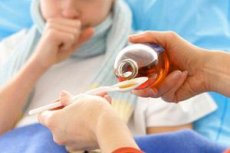
Bronchitis, as one of the types of inflammatory pathologies of the respiratory system, is simply impossible to imagine without a cough. And, in spite of the fact that even this word makes a person cower under the weight of unpleasant, painful memories, cough in itself is often more useful than harm. Thanks to it, the bronchi are cleared of pathogenic bacteria, viruses and products of their vital activity, which are united by the general concept of "sputum," and the syrup with bronchitis helps to get rid of it as soon as possible, preventing the further development of inflammation.
Indications for use
In principle, to cough with inflammatory diseases of the upper and lower respiratory tract can and tablets (antitussive or mucolytic effect). However, many doctors agree that the syrup for bronchitis and other respiratory pathologies, accompanied by a dry or wet cough, is faster and more effective. In addition, this form of preparation is suitable for treatment not only of adult patients, but also of children who are easier to swallow a sweet fragrant semi-liquid mass than a tasteless or bitter hard tablet.
A large selection of drugs in the form of a syrup helps to choose a medicine effective at different stages of inflammatory bronchial disease, taking into account the nature of the cough available. This is a very important moment in the therapy of bronchitis, requiring a professional approach, so syrups, like other medicines, should be prescribed by the attending physician. Incorrectly selected medication is only able to aggravate the patient's condition.
Disease in the vast majority of cases begins with a dry, painful, barking cough, accompanied by burning and pain in the chest. The peak of coughing attacks occurs in the evening time, in connection with which cycles of sleep and wakefulness are violated.
Dry cough is often called unproductive, because all attempts to cough up too much viscous sputum in the bronchi are unsuccessful. To withdraw thick mucus from the bronchi resort to mucolytics (preparations that dilute sputum). At this stage of the disease, they are most relevant.
When the disease passes to the next stage, the cough changes its character. He becomes wet, with sputum secretion, subsiding towards evening and bringing a lot of unpleasant minutes in the morning. Alas, what we call sputum, in fact, is nothing more than mucus (sometimes with an admixture of pus or blood), so coughing it out is not so easy. But to leave this bacterial-viral component in the body is very dangerous, because it will promote the spread of inflammation deep into the respiratory tract and cause such severe pathologies as bronchopneumonia and pneumonia.
Use mucolytics at this stage can only be with a difficult cough with a small amount of viscous sputum. If the mucous secretion is sufficient, phlegm-thinning preparations can provoke a condition when a person simply does not have time to cough and spit.
In this case, preparations of a different plan are shown - expectorating syrups, which in bronchitis will help to withdraw phlegm from the respiratory tract, not only increasing its quantity, but stimulating productive cough due to contractile movements of the bronchial walls. Thus, stagnation of mucus in the respiratory tract can be prevented.
Syrup with obstructive bronchitis, when besides moist cough, there is also difficulty breathing due to edema of the tissues and spasm of bronchial walls, also should have an expectorant effect. However, preference should be given to drugs with a double, or better with a triple effect: dilution of sputum, stimulation of its expectoration and anti-inflammatory effect.
In general, anti-inflammatory syrups in bronchitis are shown both at an early stage of the disease and at its height. After all, they help not only to remove phlegm from the bronchi, but also to reduce inflammation symptoms such as swelling and spasms that prevent oxygen from penetrating freely into the lungs and in sufficient quantities, and from them to other needy organs.
With chronic bronchitis, reminiscent of itself for several years with rather long painful bouts of cough, syrups are prescribed with an antitussive effect. Chronic disease is often observed in smokers, people living or working in adverse environmental conditions, allergies. Sputum in this case stands out a little or it is missing at all. Syrups in this case are used for the symptomatic treatment of a painful cough in order to facilitate the general condition of the patient.
Cough syrups are also effective for fighting the residual cough, which can cause the patient to suffer a bronchitis after a month or more after recovery. Assign them only if the infectious process does not spread to the lower respiratory tract, in particular the lungs.
Cough syrups can not be used for obstructive bronchitis and inflammatory pathologies of the lower respiratory tract, as they only provoke congestion in the respiratory system. To ease the patient's condition can only drugs that facilitate the withdrawal of phlegm due to a decrease in its viscosity, stimulating its coughing, but not coughing up in any way.
Pharmacodynamics
As we see, with bronchitis depending on the nature of the pathological process and the degree of its development, the doctor can prescribe completely different drugs (syrups and tablets) that will differ not only in the active substance, but also in their effect on the patient's body.
Thus, drugs for liquefaction of sputum, used to convert dry cough to productive, change only the nature of mucus, making it less viscous, due to which it is easily removed from the bronchi (sometimes even without coughing). The intake of such drugs must necessarily be combined with the use of a large amount of fluid. Due to this, sputum becomes larger, and its structure is less viscous.
These drugs affect the protein structure of the mucous discharge, destroying the bonds in it, thereby making the sputum closer to the liquid than to the viscous mucus. Due to the drunk water of phlegm, it becomes even more, which means that the dry strained cough turns into an abundant productive cough, which contributes to the active removal of viruses and bacteria from the body.
Expectorant syrup in bronchitis acts differently. It facilitates cough by strengthening the cough reflex. Active components of such drugs correct sputum characteristics, increase peristalsis of bronchioles, improve the motility of bronchial walls and mucosal status. They also in some cases have a stimulating effect on bronchial receptors, as well as on the glands of the oral cavity and stomach, due to which their secretion is slightly increased.
Pharmacodynamics of antitussive drugs is based on reducing the irritant effect on the cough center and suppressing the cough reflex.
The difficulty of self-selection of syrups in bronchitis is that drugs that have one of the above actions are very, very few. Modern effective medicines have a complex effect on the body: expectorant and anti-inflammatory, mucolytic and expectorant, bronchodilator (enlarges the lumen of the bronchi) and antiviral, etc.
Often in the instructions to the drug, you can see several useful actions that a person unaware of in medicine can seem to be even mutually exclusive. Therefore, it is always better to entrust the decision to choose an effective drug to a professional, i.e. The attending physician.
Names and descriptions of syrups recommended for bronchitis
The information from this section of the article should be used only for the purposes of acquaintance with various medicines, their action, peculiarities of application, but not for self-prescribing this or that syrup for bronchitis and other inflammatory pathologies of the upper and lower respiratory tract.
Marshmallow syrup
The main active substance of the drug is the root of the althaea, which is characterized by an expectorant and anti-inflammatory effect.
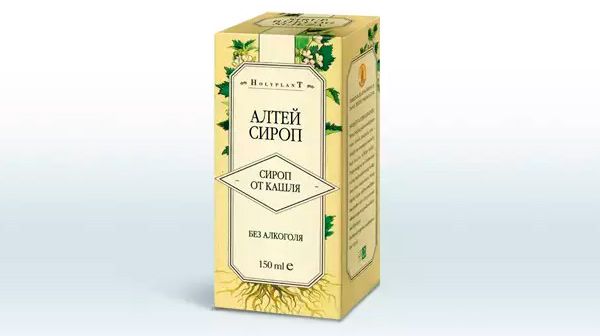
Composition and form of release. In addition to drawing from the root of the althaea, the syrup contains purified water, sucrose and sodium benzoate.
The syrup is fairly transparent with a brown tinge and the smell inherent in the plant in its composition, has a dense consistency. It is packaged in bottles and jars of dark glass. The volume of the drug in a container of 125 or 200 g. The glass packaging is packed into individual cardboard boxes.
Indications for use. The drug is intended for the treatment of inflammatory pathologies of the respiratory system. It is prescribed if the disease is accompanied by a cough with viscous sputum, for example, with bronchitis, tracheitis, laryngitis and other diseases.
Contraindications. The drug is not prescribed in the following pathological conditions:
- hypersensitivity to the active ingredient or auxiliary components of the drug,
- enzymatic insufficiency of sucrose and isomaltase,
- negative reaction of the body to fructose,
- glucose-galactose malabsorption.
Side effects. Against the backdrop of hypersensitivity to the components of the medication are frequent cases of allergic reaction.
Use during pregnancy. Syrup can be used to treat bronchitis in pregnant women. But you need to do this after consulting a doctor who can take into account all the risks associated with taking the medicine.
Method of administration and dose. Syringe althea in bronchitis in adults and children over 12 years is shown in a single dosage - 1 tbsp. Syrup for ½ liter of water. Children under the age of 12 1 teaspoon the drug is diluted in a glass of water.
Water should be taken warm, and take medicine after eating. The multiplicity of reception in both cases is from 4 to 5 times. The course of treatment is mainly limited to 2 weeks.
Overdose. The use of syrup in large doses can lead to nausea and vomiting, which requires immediate withdrawal of the drug and measures for washing the stomach.
Interaction with other drugs. The instructions to the drug noted that it can not be taken in parallel with antitussive drugs, especially if they contain codeine. Such therapy will not work, because the drugs will quench each other's action.
Storage conditions. The drug is stored at room temperature, not exceeding 25 degrees in a place protected from sunlight. Keep away from children.
Shelf life. With proper storage, the syrup retains its properties for 1.5 years.
Syrup "Alteika"
It is considered an analogue of the above described preparation with the same components. Strengthens the production of bronchial secretions, reduces its viscosity and facilitates excretion, envelops the walls of the bronchi, preventing their irritation with coughing, has an anti-inflammatory and regenerative effect.
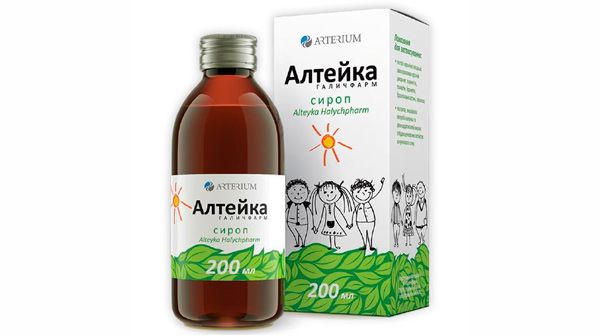
Form of issue. Transparent reddish-brown or yellowish-brown syrup is sold in dark bottles or jars of 100 and 200 ml, placed in a cardboard container along with a measuring spoon, which is very convenient for dispensing.
The drug has the same contraindications as the althaea syrup. It is used for therapy of adults and children over 2 years.
Among the side effects can be identified: increased salivation, irritation of the gastrointestinal mucosa, allergic symptoms.
Method of administration and dose. For treatment of adults and adolescents older than 14 years, a single dose of the drug will be 15 ml, for children 6-14 years - 10 ml, for children 2-6 years - 5 ml of syrup.
Drink syrup should be before meals 4 to 6 times a day for 1-2 weeks.
Shelf life of the drug at room temperature is 3 years. After opening the vial, it is stored on the bottom shelf of the refrigerator for no more than 2 weeks.
Syrup "Gedelix"
No less popular herbal preparation, liquefying phlegm and at the same time having expectorant and spasmolytic effect. He is also credited with a wound healing, antioxidant and anti-inflammatory action, as well as some antifungal and antibacterial effect.
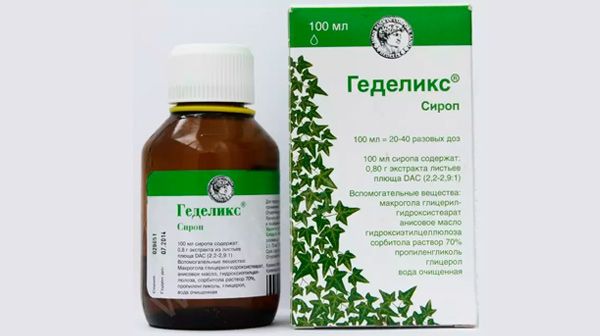
The active substance of the drug is an extract of ivy leaves. Glycerol, anise oil, macrogol, propylene glycol, water, sweetener (sorbitol) are present in the syrup as adjuvants. As you can see, the drug contains neither alcohol nor sugars, which allows using it for therapy of patients with enzyme deficiency and diabetes mellitus.
Form of issue. Transparent syrup with a pronounced yellowish-brown tinge goes on sale in glass bottles-droppers (volume 100 ml), placed in cardboard boxes together with a measuring spoon 5 ml.
Indications for use. The drug is prescribed for patients with acute or chronic course of infectious-inflammatory pathologies of the respiratory system, one of the symptoms of which is a dry cough.
Contraindications. The medicine in the form of a syrup is not accepted for bronchial asthma, enzyme deficiency of arginine, a high probability of respiratory tract spasm, as well as hypersensitivity to the components of the drug.
Use during pregnancy. The drug is not recommended for use in the treatment of pregnant women and nursing mothers.
Side effects. Quite often there is nausea in co-occurrence of vomiting, diarrhea, allergic reactions. Sometimes patients complain of epigastric pain.
Method of administration and dose. Syrup "Gedelix" in bronchitis in an adult or child over 10 years is recommended to take in undiluted form after eating. Multiplicity of admission - 3 times a day. Single dose - 5 ml of syrup.
Children's single dose (from birth to 10 years) is 2.5 ml. Children from 4 to 10 years take the medicine 4 times a day, babies 1-4 years - three times a day, newborns and children up to 12 months - once a day. In this case, the syrup is recommended to be diluted in warm water (approximately 1/2 glasses).
The course of treatment is usually from 7 to 10 days.
Overdose. There is an increase in side effects (diarrhea, nausea with vomiting, stomach pains), markedly nervous excitement.
Therapy of the condition consists in gastric lavage and symptomatic treatment.
Interaction with other drugs. "Gedelix", as well as other medicines of expectorant action, is not recommended to be taken simultaneously with drugs that suppress cough.
Storage conditions. It is recommended to store the syrup in a room with room temperature and limited access to sunlight.
Shelf life. Store and use the drug (subject to appropriate storage conditions) can be for 4 years. After opening the bottle, the syrup retains its properties for half a year.
Syrup "Erespal"
This drug is a little different. "Erespal" syrup has anti-inflammatory, antispasmodic and even antihistamine action, which is why it is shown not only for bronchitis and other infectious and inflammatory diseases of the respiratory system and ENT organs, but also for bronchial asthma in the complex treatment of the disease. The active substance is fenspiride.
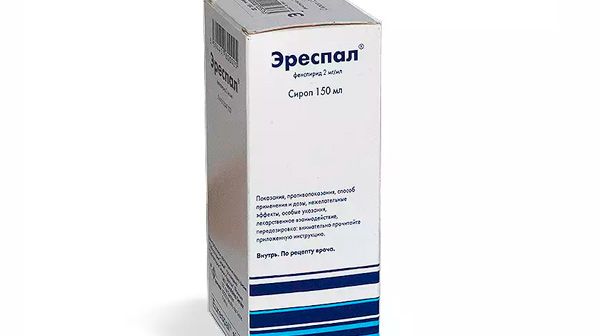
Pharmacodynamics. Syrup prevents the violation of bronchial obstruction (bronchoconstriction) and bronchospasm, reduces the formation of respiratory tract exudate, inhibits the production of bronchial secretions. It turns out to be especially useful in obstructive bronchitis.
Pharmacokinetics. Has a rapid absorption during oral administration. The maximum concentration of fenspiride in the blood is noted after 2 -2.5 hours. The half-life of the drug is 12 hours. It is excreted mainly by the kidneys, and only about 10% comes out with feces.
Form of issue. Transparent orange syrup comes on sale in plastic bottles of 150 ml. Each bottle is packed in a separate cardboard container.
Contraindications. The drug is not prescribed for hypersensitivity to at least one of its components. In pediatrics do not use to treat children under 2 years.
The sucrose sweetener is present in the syrup, so the therapy of patients with diabetes mellitus, intolerance to fructose, glucose-galactose malabsorption, a lack of isomaltase and sucrose should be carried out with extreme caution in controlling blood sugar.
Side effects. The intake of oral means, such as tablets and syrup "Esperal", is often accompanied by disorders of the digestive tract. Usually this is manifested by pains in the stomach, nausea and vomiting, stiffness of the stool.
Less frequent violations of the cardiovascular system (tachycardia with high doses of the drug), central nervous system (dizziness and drowsiness, increased fatigue), skin (various rashes on the body, itching, erythema).
Use during pregnancy. There is insufficient data on the effect of the drug on the course of pregnancy and fetal development, so it is best to use airway and lactation therapy if tested, safe medications.
Method of administration and dose. The syrup should be taken before meals. The daily dosage for adults and adolescents over 12 years varies from 45 to 90 ml (3-6 spoons).
Children from 2 years of age are prescribed depending on the weight of the patient (4 mg per 1 kg of body weight per day). If the child weighs less than 10 kg, the dosage of the drug will be from 10 to 20 ml per day.
The daily dose is recommended to be divided into 2-3 doses. The duration of the therapeutic course is determined by the attending physician.
Overdose. Symptoms: drowsiness or increased excitability, tachycardia, dyspeptic phenomena, stool disorders.
Treatment: gastric lavage, ECG monitoring, symptomatic therapy. In severe cases it is recommended to go to a medical institution.
Interaction with other drugs. It is not recommended to take concomitantly with sedatives.
Storage conditions. The drug perfectly retains its properties at room temperature.
Shelf life. You can store the syrup for 3 years.
The analog of the above described preparation is the "Inspiron" syrup, which is used to treat patients aged 3 years.
Syrup of licorice
Syrup of licorice root is a rather popular remedy prescribed for acute and chronic bronchitis, pneumonia, inflammatory diseases of ENT organs. It's not alcohol composition, it's water, so you can treat it both adults and kids.
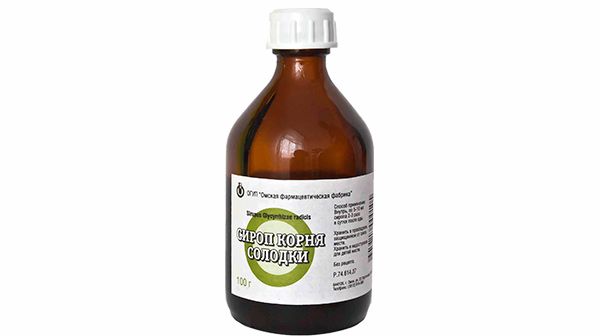
Pharmacodynamics. The drug belongs to the group of expectorants. It is also distinguished by the ability to dilute sputum, facilitating its departure. Licorice root extract and auxiliary components provide the drug with some antispasmodic and anti-inflammatory effect.
Form of issue. The syrup is a viscous liquid mass with a brown tinge and pronounced taste. It is sold in containers in the volume of 50, 100 and 200 ml, packed in cardboard bundles along with a spoon for dosing.
Contraindications. Limitations in the use of the drug are associated with the properties of licorice root. So the syrup is not prescribed if the patient in addition to infectious and inflammatory diseases of the respiratory system, accompanied by a cough with viscous sputum, suffers from liver and kidney pathologies with disruption of their work, hypokalemia, hypertension, obesity of 3-4 degrees. It is forbidden to use this medicine and with increased sensitivity to its components.
Syrup contains sucrose, which means diabetes and metabolic disorders of carbohydrates, the drug should be used with extreme caution, controlling the level of sugar in the blood.
Use during pregnancy. Licorice has the property to influence the synthesis of estrogens and causes disruption of the hormonal balance, which is highly undesirable during pregnancy. Therefore, the drug is extremely undesirable to use during pregnancy and breastfeeding.
Side effects. Usually, undesirable reactions against licorice syrup are caused by hypersensitivity to the drug (allergic reactions in the form of redness of the skin, rashes and itching on it) or the use of large doses of the drug for a long time (violation of water-electrolyte balance, hypokalemia, edematous syndrome, AD, myopathy and myoglobinuria).
Method of administration and dose. Take the syrup doctors recommend after eating. Multiplicity of admission is 3 to 4 times a day. You do not need to dilute the medicine, just drink it in small amounts.
The dose for adults and adolescents from 12 years is 45-60 ml per day. Children 10-12 years old can take the drug at a dosage of 22.5 to 40 ml per day. To children from 4 to 9 appoint from 7,5 to 22,5 ml per day, and for very young (1-3 years) daily dose should not exceed 20 ml.
Overdose. With prolonged therapy with the drug and taking large doses, symptoms may appear that are similar to the side effects of this medication. Treatment is aimed at the removal of unpleasant symptoms.
Interaction with other drugs. One of the side effects of licorice syrup is a violation of the water-electrolyte balance. Such a condition can trigger not only abuse of the drug, but also its reception in parallel with certain types of medicines: thiazide and loop diuretics, laxatives, corticosteroids, cardiac glycosides and some drugs that regulate the rhythm of the heart. About application of the above-mentioned drugs it is necessary to notify the attending physician beforehand.
Storage conditions. Store the medicine at room temperature below 25 degrees in a dark place.
Shelf life. The syrup retains its properties in a sealed package for 2 years. If the vial was opened, then it can be used within six months.
A brief overview of other effective syrups for bronchitis
The choice of a suitable syrup for bronchitis entirely depends on the attending physician. And not always the doctor is inclined to widely advertised and popular medicines, in fact syrups for struggle against a tussis are great, so you can always choose the one that will show the best result in each specific case.
Here, for example, the syrup "Bronchomax", which according to the active substance can be considered an analogue of the drug "Erespal". It has all the same properties, indications and contraindications, but in its composition there is a banana flavor, which is sure to appeal to small patients who are already 2 years old. The medicine is available in 100 and 200 ml bottles. You can use it for 3 years.
Famous for many mucolytic and expectorant "Ambroxol" is also available as a syrup with a wide variety of flavors (apricot, raspberry, orange, menthol), sweetened with saccharin and sorbitol. The drug perfectly dilutes and removes phlegm, softening the cough.
Its action lasts more than 10 hours. The active substance (ambroxol hydrochloride) easily penetrates into the lung tissue and its maximum concentration in the blood is noted already 2 hours after the oral administration. It is excreted mainly by the kidneys. It is intended for treatment of only a damp cough.
Syrup is not prescribed to patients with hypersensitivity to the drug and hereditary intolerance to fructose. Do not use to combat dry cough. The drug is well tolerated by most patients. During pregnancy, do not recommend taking the medicine in the first trimester.
Children over 12 years and adults take syrup in a single dose of 10 ml three times a day. After 3 days, the dosage is reduced to 5 ml 3 times a day. Children 6-12 years old take the drug 2 times a day for 5 ml, kids 2-6 years - 2.5 ml 3 times a day. Children under 2 years of age are prescribed syrup in a single dose of 2.5 ml with a frequency of intake 2 times a day.
Ambroxol is able to enhance the action of antibiotics, which makes it possible to use them together for bacterial infections.
The analogue of Ambroxol with the same active ingredient is the well known Lazolvan syrup .
Syrup "Bronhomed" belongs to the category of herbal preparations with rich medicinal composition (ginger, cinnamon, basil, nutmeg, sarco-system, kalotropos, etc.). He fights with all kinds of cough, eases breathing and excretion of phlegm, relieves heat and runny nose.
The drug is not used for serious gastrointestinal diseases, coughing against the background of eosinophilia, problems with the metabolism of glucose and carbohydrates, hypersensitivity to the components of the drug, alcoholism. In pediatrics it is applied from 6 years.
The syrup is incompatible with alcohol. Side effects are observed when disregarding contraindications to use.
Doctors recommend taking medicine four times a day, diluting it in half a cup of warm water (the children are diluted in 50 ml of water).
A single dose for adults and adolescents older than 14 years is from 5 to 10 ml, for children - 2.5 ml.
The drug can be used with antimicrobial agents, it is unacceptable - with alcohol-containing solutions and narcotic substances. You can use it for 3 years.
Herbion syrup is another phytopreparation based on the extract of plantain and mallow with sucrose, ascorbic acid and orange oil. According to the instructions to the drug, it has an expectorant, antibacterial and immunostimulating action. Malva extract is able to suppress cough reflex, which is necessary for dry cough, and plantain, in turn, contributes to the development of bronchial secretion and purification of the bronchi from viscous hard-to-remove masses.
The drug is designed to treat patients from 2 years. In infancy, its use is limited. Do not prescribe the drug if hypersensitivity to the components of the drug, during pregnancy and breastfeeding. It is undesirable to take a syrup for patients with diabetes mellitus and glucose metabolism disorders.
Side effects of the drug are limited to allergic reactions against the background of intolerance to certain constituents of the drug.
A syrup based on the plantain extract is taken orally with warm water. Multiplicity of reception - 3-5 times. A single dose of the drug for adults and adolescents from 14 years is 10 ml of syrup, for children 2-14 years - from 5 to 10 ml. Children are given the drug no more than 3 times a day.
Syrup is not used concomitantly with other drugs that have the ability to suppress a cough reflex.
Store and apply the drug in the form of a syrup can be for 2 years.
Syrup "Pertussin" is a herbal preparation based on the extract of thyme. It is able to strengthen the secretion of bronchial glands and reduce the viscosity of sputum, stimulates the coughing up of mucous secretions, facilitates breathing.
The drug is not prescribed for hypersensitivity to the components of the drug, heart failure in the stage of decompensation, low blood pressure, arteriosclerosis of the vessels, anemia, kidney pathology, diabetes, alcoholism. Do not apply in the 1st trimester of pregnancy and during lactation. In pediatrics used to treat children older than 3 years.
Single dose of the drug for patients over 12 years is 15 ml, for children over 9 years - 10 ml, for children over 6 years - 5 ml, for children up to 6 years - 2.5 ml.
Take the medicine 3 times a day. It is recommended that children dilute it in 20 ml of warm water.
You can buy the drug in 50 and 100 ml bottles. You can store it for no more than 4 years.
Syrup "Stoptussin" - a synthetic drug based on butyrate citrate and guaifenesin. Has an effect similar to syrup "Gerbion". Has a caramel-iris flavor. Syrup is used for the treatment of persistent dry cough with bronchitis and other acute pathologies of the respiratory tract.
Do not appoint with intolerance components of syrup and myasthenia, for the treatment of cough caused by smoking, in the therapy of bronchial asthma and chronic bronchitis. Not applicable in the 1st trimester of pregnancy and during breastfeeding.
Despite the fact that the drug is synthetic, it can be used in pediatrics from the age of 6 months. The optimal dosage is selected depending on the patient's body weight. A single dose for infants weighing less than 12 kg is 1.25 ml. Children with a body weight of 12 to 40 kg are prescribed 2.5 ml per reception. The adult dosage ranges from 5 to 7.5 ml. The frequency of taking the drug is 3-4 times a day as prescribed by the doctor.
The interval between doses should be about 5 hours. Take syrup after eating, squeezed it with enough liquid. The course of treatment should not exceed 1 week.
A syrup is sold in a 100 ml vial. Shelf life - 4 years.
In obstructive bronchitis, a doctor may prescribe an expectorant syrup "Ascoril" based on sulfobutamol, bromhexine and guaifenidine. However, it is not suitable for patients with severe cardiovascular pathologies, hyperthyroidism, ulcerative gastrointestinal lesions, liver diseases. Syrup can be given to children from 2 years.
A single dose of the drug for patients over 12 years is 10 ml, for children - from 5 to 10 ml. Multiplicity of admission - 3 times a day.
This drug has many side effects, so it can only be used for the intended purpose and under the strict supervision of the treating doctor.
You can buy it in 100 and 200 ml bottles. Shelf life - 2 years.
An analogue of the drug "Ascoril" is the syrup "Kashnol".
Syrup "Broncholitin" - a drug based on glaucin and ephedrine, which has antitussive and bronchodilator effect. It is used for acute and chronic forms of bronchitis for fighting dry cough.
It is shown for use from 3 years. It is not prescribed for IHD, elevated blood pressure, CHF, pheochromocytoma, thyrotoxicosis, insomnia, prostate adenoma, zakratougolnoy glaucoma, hypersensitivity to the drug. Do not apply in the first 3 months of pregnancy and lactation.
The syrup should be taken after a meal. The adult dosage is 10 ml, the frequency of administration is 3-4 times a day. Children's dose (age 3-10 years) is 5 ml, take it three times a day.
It is worth mentioning one more interesting preparation. "Atma" is not exactly a syrup, but rather a homeopathic drop having many useful properties. They well dilute sputum, facilitate its passage through the bronchi, strengthen immunity, have anti-inflammatory and anti-allergic effects. Drops can be used to treat acute and chronic bronchitis, including obstructive, bronchial asthma and chronic asthmatic bronchitis.
Prescribe the drug to patients older than 12 years, who have no hypersensitivity to the components of the drug (caspambucus, sulphuricum natrium, dulcamara, arsenic oxide, emeticus tartarus). During pregnancy and lactation, the drug is administered under the supervision of a doctor. Possible use in childhood with reduced dosage.
Adult drops are recommended to take 10 drops. Multiplicity of administration -3 times a day. The pediatric dose varies from 1 to 7 drops, depending on the age. Syrup is bred in 1 tbsp. Water. Thoracic is given by 1 drop of medicine, dissolving it in 1 tsp. Warm water.
The therapeutic course can take from 4 weeks to 3 months, depending on the severity of the pathology.
The drug prescribed by a doctor can be stored at room temperature, away from electromagnetic radiation for 5 years.
This, of course, is not all the existing drugs shown for the treatment of various types of cough in bronchitis. There are many other fairly effective and safe medicines that a doctor can prescribe for fighting a cough. But the decision to prescribe a particular drug is always more appropriate to entrust to the doctor, rather than relying on your life experience and advice from other people far from medicine.
Syrup for bronchitis for children
When a child and parents are sick, and doctors with a high degree of caution approach the treatment of the baby, which means that the drugs choose the safest for the child's body. After reading the descriptions of various syrups used for bronchitis, you can see that almost all drugs can be used in childhood.
In general, this form of release of drugs in a sense can be called childish. Babies face great difficulties when swallowing hard tablets, but sweet sweet liquid syrup (and even with their favorite tastes), they usually drink to "hurray."
Nevertheless, when choosing an effective syrup for bronchitis for a child, one must take into account not only its composition, taste and color, but also information from the instruction, indicating at what age and in what dosage it is possible to use syrup for treating children.
Most syrups, both natural and synthetic, are allowed for children over 2 years of age (Alteika, Esperal, Inspiron, Bronhomax, Ascoril, etc.). However, there are preparations whose use is recommended from the age of 3 (phytomedication "Doctor Mom", "Suprima", "Broncholitin", etc.). Sometimes a doctor can prescribe such drugs and babies who have not reached the age of 2-3 years, but in this case he sets a safe dosage and controls the course of treatment of the baby.
But the drug "Bronhomed" is recommended to be used to treat children no younger than 6 years. And this must be taken into account before starting to stuff the baby with "adult" medications.
There are preparations for children of the first year of life. For example, the syrup "Stoptussin" can be prescribed from the age of 6 months, and "Gedelix" is safe from the very birth of the baby. Children can also prescribe syrups Ambroxol, Lazolvan, and Kashnol for the first year of life.
It is necessary to understand that good syrups from bronchitis are not those that are widely advertised in the mass media, but those that are selected in accordance with the diagnosis, type of cough, peculiarities of the organism and the age of the patient.
It is a mistake to think that herbal preparations are less safe than synthetic drugs, because they have their own contraindications and side effects. And not always they are limited only to skin reactions. In confirmation of this, it should be noted that the synthetic "Stoptussin" is allowed to be used for therapy of babies from 6 months, and the phytomedication "Doctor Mom" (basil, licorice, turmeric, aloe, ginger, etc.) and "Suprema" with identical plant composition are allowed only from the age of 3 years.
Selection of an effective drug is an important point in the therapy of patients of any age. The syrup prescribed by the doctor for bronchitis should cope with its task 100%, without harming the patient's body. This is a great responsibility, which should not be taken on the shoulders of people who do not have the appropriate medical education. Otherwise, treatment can turn into a new torment.
Attention!
To simplify the perception of information, this instruction for use of the drug "Effective syrups with bronchitis: from cough, expectorant, on herbs" translated and presented in a special form on the basis of the official instructions for medical use of the drug. Before use read the annotation that came directly to medicines.
Description provided for informational purposes and is not a guide to self-healing. The need for this drug, the purpose of the treatment regimen, methods and dose of the drug is determined solely by the attending physician. Self-medication is dangerous for your health.


 [
[